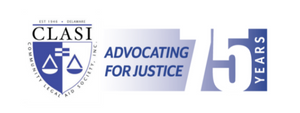Protecting the Most Basic American Right
Voting is a way to make your voice heard and for you to express your opinions, and to influence who is making important laws and policies. If you do not vote, you are letting others make decisions without you getting a say in what they decide. Across the country people with disabilities have not voted because polling places are not accessible, there are discriminatory practices in place, individuals (wrongly) think that they cannot vote due to their disability or they think their vote will not make a difference. Disability Rights Delaware, formerly known as the Disabilities Law Program, of Community Legal Aid Society, Inc. (CLASI) is here to ensure that people with disabilities can access one of their most fundamental rights, the right to vote!
Disability Rights Delaware & Voter Rights
The Protection and Advocacy for Voting Access (“PAVA”) program of Disability Rights Delaware provides advocacy, education, and training to promote and facilitate the right of individuals with disabilities to participate in the election process. We ensure that individuals with disabilities can participate in the election process by:
- Providing training/outreach to individuals and community agencies
- Assisting individuals with the registration process
- Monitoring polling sites for accessibility issues that might inhibit a person with disabilities from participating
- Monitoring new regulations/statutes related to voting
- Systemically and on an individual case basis representing voters in voting-related issue complaints
Common Barriers to Voting for People with Disabilities
- Inaccessible polling location (travel routes from parking to location/entrance)
- Lack of accessible parking
- Lack of ramps
- Transportation
- Misinformation about support individuals being allowed in the poll booth
Know Your Rights
Click here for a one-page flyer in English and Spanish about your rights as a Delaware voter with disabilities:
Delaware Voting Rights for People with Disabilities Flyer – English and Spanish
Voters have the right to take a person of their choice into the voting booth if they require assistance in voting. They may also ask for assistance from official poll workers. People with cognitive impairments may vote, even if they have a guardian, under most circumstances. Voters with low vision or other impairments can enlarge the font and change the contrast of the screen on the voting machine. Any voters who prefer listening to their ballot may also utilize the Universal Access Console (“UAC”) connected to the voting machine, whose buttons are in Braille and which allows voters to use headphones to listen to rather than read the ballot. Other accessible features are also available.
While presenting identification is preferred when voting and will expedite the voting process, a voter without identification who is listed in the poll book may sign an affidavit affirming their identity. Delaware does not require photographic, or any other identification, for most registered voters. If you are a first-time voter who registered by mail, you will require identification. Whether voters bring identification or not, it may be helpful to bring mail, such as utility, tax, rent, or mortgage statements showing their name and address.
If a person feels intimidated or interfered with in their ability to vote, they should immediately reach out to the polling site supervisor for assistance. It is illegal under Delaware law for a person to “by force, threat, menace or intimidation, prevent or hinder, any person…qualified to vote from voting according to said person’s choice at any such general, special or municipal election.”
The only individuals allowed to challenge a person’s credentials to vote are the two official party challengers located inside each polling location. It is worth noting that these challengers do not decide whether a person is eligible to vote; rather, a vote is taken of the two judges and the inspector. Individual voters who are found not to be eligible after a challenge are to be offered a provisional ballot.
The Office of the Delaware Election Commissioner has a voter portal, https://ivote.de.gov/. At this site, a voter can check the status of registration and confirm assigned polling place locations. On Election Day, poll workers will make every effort to identify the correct polling place for voters who may have gone to the wrong polling place. However, voters should also be aware of their right to cast a provisional ballot in federal elections, should the polling place refuse to allow them to vote. There is also a procedure available to petition in Superior Court under certain circumstances. Identification is required for provisional voting. Voters may also file complaints with the Delaware Election Commissioner.
If You Need Help
Individuals with disabilities who encounter problems with access at their polling places on Election Day should bring these barriers to the attention of poll workers, their county Board of Elections, and Nina Kegelman, Protection and Advocacy for Voting Access (“PAVA”) Voting Rights Advocate with Disability Rights Delaware, who can be reached at nkegelman@declasi.org or 302-856-2027.

